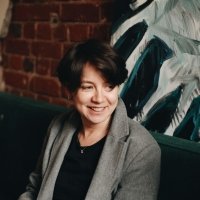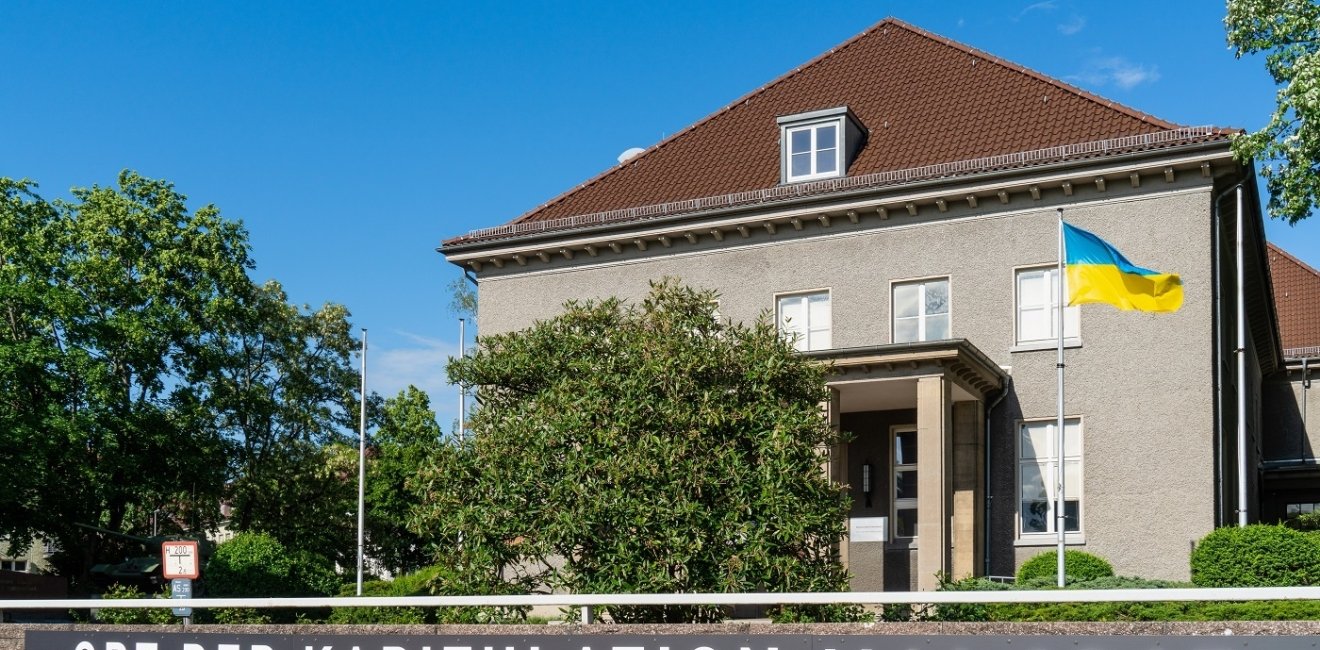
A blog of the Kennan Institute
Lesha, 45 years old
“I now live in the Museum of Germany’s Surrender [the Museum Berlin-Karlshorst]. There are old Soviet tanks standing around here with words ‘For the Motherland’ on them.”
Lesha learned about the war while incarcerated at a police precinct station house. He was in custody for thirty days. This was his second administrative arrest. As often happens, he could have been detained on leaving the station house. And had that happened, it would have meant a criminal term for him.
Lesha is a musician, a school music teacher, and composer of the song "Beware, I'm a Kind Dog." His father worked at Memorial, Russia’s most prominent memory and human rights organization, recently shut down by the Russian government. When the trial to liquidate Memorial began, about a year ago, in late 2021, Lesha grabbed a poster, crossed to the side of the street opposite the prosecutor’s office, and unfolded it: “We Are Memorial.”
This is how he got his first arrest and detention, for twenty-five days. After the appeal, his term was reduced by one hour. “A trifle, but nice. A trifle, but a spit in the face.” Fortunately, Lesha's sister had power of attorney, issued long ago, stating that she could represent his interests, including in court. By New Year’s Day of 2022, Lesha had been released.
“On February 23, after Putin’s speech, I felt sick, but I still thought it was a bluff. I wrote on my Facebook page that I was going to go out and sing songs. I went to Pushkin Square and sat down with a guitar; I didn’t even get it out. I saw three cops looking at me and talking. Then another group came, and one guy was immediately tied up. Then a guy came out with a piece of notebook paper on which was written “No to war.” He stood alone. Everyone was afraid to approach him. Everyone understood everything. I walked over and shook his hand. And quickly began to leave. They grabbed me and took me.”
Lesha spent the whole night at the police station. When he woke up, he found a new neighbor in his cell. “I asked him. What is going on? He said it was war!” This was how Lesha found out that the war in Ukraine had begun. “I was waiting for this, but I cried.” At his trial, Lesha was given another thirty days of imprisonment.
“I understood that a third arrest would be treated as a felony, not a misdemeanor, which is a real jail term. I knew I wouldn’t be able to stand it. But who will protest? I didn't think about anything but protesting. And also about the fact that they could detain me again while I was leaving the precinct station.” That was a common practice by then.
His second detention was harder for Lesha, much harder than the first. “The Russian radio was on all the time, terrible music all the time. There were a lot of people in the cell. I thought I would go crazy. I plugged my ears with paper, then with earplugs and put headphones on top of them, but it didn’t help.” There was no talk of war on the radio; the announcers talked about new laws that the Duma adopted, and since Lesha had read a lot about dissidents, he understood how to listen to the news, how to understand what was happening. Foreign businesses were leaving Russia, all those familiar brand names were leaving. “In a way, it was easier for me. I didn’t read the real news, I only read through the official news.”
Lesha's sister visited often and tried to persuade him to leave the country immediately after discharge. “I was very annoyed by this conversation. She was very sick, I saw it.” And he didn't say anything. “I understood that everyone was worried about me, they were reading the news, people were dying, lots of people around us were leaving. She cried. But I felt uncomfortable, I felt pushed. Everything had already been decided for me. I couldn't think. My brain froze. For the past few days, I had been sitting with a pen and paper trying to write something, to think. And I realized that I didn’t want to sit anymore, I just couldn’t stand it.”
When Lesha came out of the precinct station, he already knew that on that same evening he, his sister, and her fifteen-year-old daughter had tickets to travel through Turkey to Montenegro. “My dad and friends met me. I kept looking around to see if anyone was going to stop me. But no one was going to. We immediately went to do PCR tests. Some friends dropped by. I was super tired. I didn’t want anything. In the evening we went to Sheremetyevo.” Lesha took with him his guitar, a book of Japanese poetry, Doctor Zhivago (the 1957 novel by Boris Pasternak), E.T.A Hoffmann's fairy tales, and a diary. “I even forgot the only 100 euros I had. I didn’t decide anything, I didn’t think anything. Everything was decided by the family.”
At passport control, the border guard said that Lesha should go with him. “I was wildly scared. Then my sister began to wave her piece of paper stating she was my public defender. This piece of paper had no power at that moment, but he led us all together. He didn't know what to do with us either. He talked on the phone for a long time. During that time my niece picked up my phone and quickly erased all the messages on my Telegram messaging app. My sister had already erased all my Facebook posts.” After some time, the border guard cleared them for boarding.
“I went to a country where I had been many times, where my close friends from different periods of life were. We received a very warm welcome." For some time, Lesha lived with his sister and niece in an apartment rented for him by his cousins from America. "I felt bad. I had a sense that I couldn’t appreciate how lucky I was. My English is not very good. I tried to learn Serbian. I tried to live without thinking about the future. It was impossible to think about the future. And it doesn’t work.”
The background to all of this was Memorial’s liquidation process. In the fall of 2022 Lesha’s dad had had his bank accounts blocked. Memorial received the Nobel Prize on the day of the liquidation trial, and Lesha’s dad left Russia. “I was waiting for something, but I didn't even know what I was waiting for,” Lesha says. He began to do antiwar concerts in the Montenegrin town of Tivat, to play music with children, and to help in the local refugee organization "Shelter." “At the same time, it was embarrassing for me to make contact—after all, I am Russian. Day after day passed, and I did not know what to do. At the end of the summer, they gave me a German visa.”
Lesha did not want to go. “My grandmother was born here in Germany, my roots are here. But it’s hard for me mentally. I am lonely. I don’t understand my role here. All my emotions are extinguished. I understand that everyone helps me all the time, but I still don’t feel relieved.”
Since autumn, Lesha has been in Germany. His sister is in Budapest and his parents are in the Czech Republic. They will celebrate the New Year together. “Why are you asking me about my plans? I don't want a future anywhere. You can call it naive, but I want it all to end and I want to go back to Russia. That is what I want."
The opinions expressed in this article are those solely of the author and do not reflect the views of the Kennan Institute.
Author

Independent Journalist

Kennan Institute
After more than 50 years as a vital part of the Wilson Center legacy, the Kennan Institute has become an independent think tank. You can find the current website for the Kennan Institute at kennaninstitute.org. Please look for future announcements about partnership activities between the Wilson Center and the Kennan Institute at Wilson Center Press Room. The Kennan Institute is the premier US center for advanced research on Eurasia and the oldest and largest regional program at the Woodrow Wilson International Center for Scholars. The Kennan Institute is committed to improving American understanding of Russia, Ukraine, Central Asia, the South Caucasus, and the surrounding region through research and exchange. Read more

Explore More in The Russia File
Browse The Russia File
Chechnya as a Model of Modern Russia

Russia’s Indigenous Communities and the War in Ukraine

Gas and Power in a Changing US–Russia Relationship

